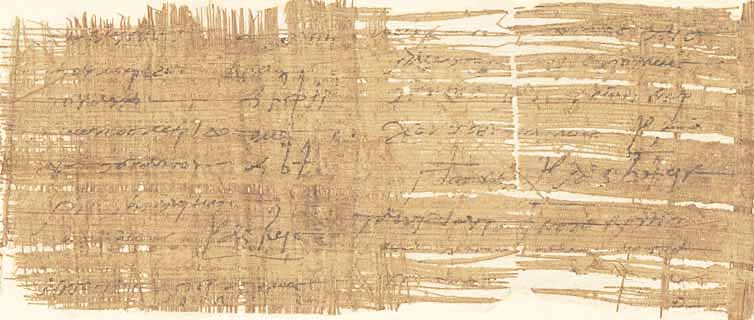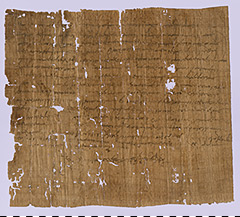P.Berl.Frisk 5 = SB V 7519 (P. 13921)
Business was also done in antiquity. On papyri, parchments and ostraca countless texts survived that show the business acumen of the people of that time and provide insights into these aspects of life. Business transactions conducted by women, however, are not very frequently documented. But some business documents of a certain Aurelia Kyra from Hermupolis in Middle Egypt are kept in the Berlin Papyrus Collection. A striking example of such a document is the lease agreement of the 14th of May 510 A.D. presented here, which is preserved fragmentarily on papyrus.
In this contract Aurelia Kyra, also called Eusturgia, who is living in the nome capital Hermupolis in Middle Egypt, and Aurelius David, a farmer from the nearby village Pselamynthis, regulate the details of the lease of farmland. First, the leased piece of land is described in more detail. It concerns 7 aruras (almost 2 ha) of unirrigated arable land in the area of the village Pselamynthis, which the tenant can use. He chooses the crop himself. But is not explicitly mentioned in this contract. However, since the annual rent is 30 artabas of wheat and 6 artabas of barley, it can be assumed that this grain should also be cultivated.
Another detail about this leased piece of land is very interesting. The land did not belong to the lessor. It was pledged to her by an Archontia from Hermupolis. It can be assumed that this arable land may have provided security for a loan, as we know it from comparable texts. After all, this also has consequences for the tenant Aurelius David. The lease agreement with him is valid for the duration of this transaction between Aurelia Kyra and Archontia.
At the end of the document, the tenant confirms this contract. However, he apparently cannot write. The writer Aurelius Theon explicitly notes that he signed for the lessee, who is unable to write. There follow 3 witness signatures which confirm the correctness of the contract and the signature of the issuing notary.
Overall, this lease contract shows very clearly how enterprising Aurelia Kyra was. Apparently she had money that she gave as a loan to Archontia. With the farmland she had received as security for the loan, she continues to make a profit by leasing it to Aurelius David and getting an annual rent from him. Such deals, however, do not seem to have been an isolated case for Aurelia Kyra. In 5 further leases of the Berlin Papyrus Collection she appears over a period of about 45 years. So we can assume that Aurelia Kyra worked very regularly as a businesswoman.



